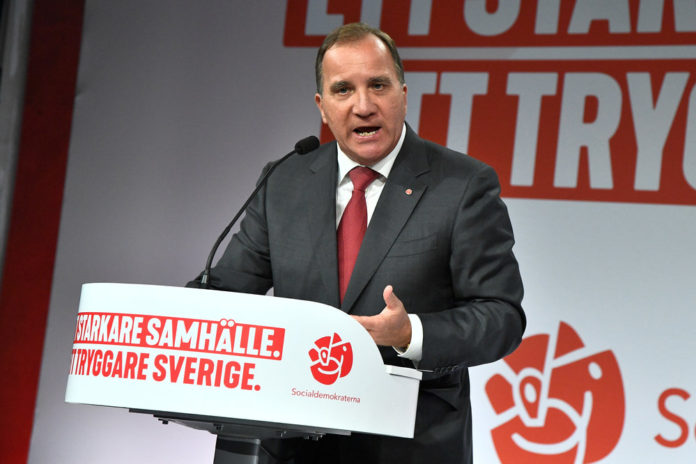STOCKHOLM, Sept 10, 2018 (BSS/AFP) – Sweden faced political deadlock on
Monday after the far-right made gains in legislative elections that left the
question of who will form the next government up in the air.
The prime minister is usually the leader of the party with the most
votes, but Sweden’s fragmented political landscape after Sunday’s election
makes it impossible to predict who will form the next government.
As expected, neither the centre-left nor the centre-right bloc obtained a
majority.
The far-right Sweden Democrats solidified their position as third-biggest
party and kingmaker, albeit with a lower score than they had expected.
Far-right parties have gained strength in elections in recent years in
several European countries, including Germany and Italy.
Politicians in Sweden will now “need a lot of imagination” to form a
government, daily Svenska Dagbladet wrote.
“However the dramatic bloc battle plays out, it looks like it will be
difficult for Sweden to have a functioning government,” paper of reference
Dagens Nyheter wrote in an editorial.
Social Democratic Prime Minister Stefan Lofven’s “red-green” left bloc
enjoys a razor-thin one-seat lead over the centre-right opposition Alliance.
Fewer than 30,000 votes separate the blocs and nearly 200,000 ballots
have yet to be counted, including votes cast in advance and abroad.
The Social Democrats won 28.4 percent of votes, down 2.8 points from the
2014 elections, their worst score in a century.
“Nevertheless, voters made the Social Democrats Sweden’s biggest party,”
Lofven said.
He has extended an invitation to the opposition in a bid to break the
deadlock.
“We need a cross-bloc cooperation,” he told his party supporters.
Lofven was meeting Monday with his party executive to discuss the road
ahead.
The four-party Alliance has however rejected his offer, urging him to
step down and make way for them to build a government.
“This government has had its chance. It has to resign,” Alliance
opposition leader Ulf Kristersson told his conservative Moderate party
supporters.
– ‘Very uncertain situation’ –
Lofven is seeking a new four-year mandate but he will have difficulty
forming a stable government. He, like all of the other parties, has
categorically ruled out any cooperation with the far-right.
He could try to build a similar government to the one he formed in 2014:
a minority coalition with the Greens that relies on the informal support in
parliament of the ex-communist Left Party.
But it would then be under constant threat from the Sweden Democrats,
out to topple it at the first opportunity.
They are ready to block any attempt to pass legislation, such as the
autumn budget bill.
Lofven could also invite the Centre and Liberal parties to join him at
the negotiating table.
“If the red-green bloc is bigger, the Centre and the Liberals hold the
key and not Jimmie Akesson,” the Sweden Democrat leader, said University of
Gothenburg political science professor Mikael Gilliam on Swedish public
radio.
With one major caveat: the Centre and Liberals are members of the
Alliance, together with the Moderates and Christian Democrats.
Despite their differences, notably on immigration policy, the Alliance
parties that ruled Sweden from 2006 to 2014 have agreed to try to form a
government together.
But that is no easy task.
The Alliance would need the far-right’s support to obtain a majority.
It would have to either make policy concessions in exchange for the
Sweden Democrats’ support or offer key positions on parliamentary committees
that draft legislation.
The Sweden Democrats won 17.6 percent of votes — up almost five percent
from the previous election.
The party’s leader Akesson told Swedish public radio on Monday he
expected to wield major influence.
“He who understands first that he can talk to me will have the easiest
time building a government and leading this country for the next four years,”
he said.
But, he told news agency TT, “we have a long list of demands we’re going
to set in any negotiations.”
To avoid that situation, Kristersson appears to favour some form of broad
cross-bloc cooperation with the Social Democrats.
In the past four-year mandate, the two have signed 26 deals to pass
legislation, notably on immigration, energy and the climate.
“The most likely situation will be that the Alliance will form a
coalition together and try to seek cross-bloc support,” David Ahlin, opinion
chief at the market research company Ipsos, said.
Voter turnout, traditionally high in Sweden, was 84.4 percent, official
figures showed.



